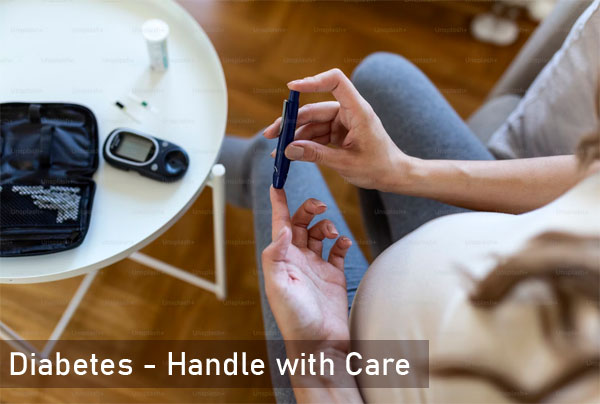
Diabetes Mellitus commonly known as Diabetes is a health disorder, This happens when the amount of glucose or sugar content in blood reaches higher than normal, Glucose is the main source of our body's energy which means when you are energetic and active Glucose plays a vital role and the source of Glucose in our body is from the food we intake.
Glucose is not a direct substance, during food digestion, carbohydrates - or carb - break down into glucose which is carried by the bloodstream to various organs of the body.
Increase in blood sugar levels can cause serious and sometimes life threatening health problems.
But how does blood sugar level increase or decrease...
Insulin, this is a hormone developed in our pancreas, Insulin helps glucose to get into our blood cells which is later used as energy by our body and when there is no insulin produced or less insulin is produced glucose enters into the blood without the help of the hormone insulin. So in depth insulin controls the blood sugar levels on a daily basis, problem to insulin production leads to high or low blood sugar levels.
Type 1 Diabetes:
In this case our beta cells in the pancreas are destroyed by our immune system for no reason, some experts say, this to be a genetic disorder which plays major role in destroying.
This means our body can no longer generate insulin as much as required and the glucose from the food is absorbed directly to the blood and stays in the blood for longer duration.
Type 1 diabetes start suddenly and in most cases before the age of 20. This condition can be controlled by taking insulin injections.
Overall Type 1 Diabetics are insulin dependent and have to live with insulin injections from outside.
Type 2 Diabetes:
In type 2 diabetes, the pancreas produces sufficient insulin but the target cells in the blood are not responsive to insulin resulting in glucose not absorbed properly, thus glucose stays in the blood itself.
in other words type 2 diabetes is "insulin resistant" reason could be genetic factors, lifestyle disorders naming Obesity, Inactive Lifestyle, unhealthy diet, Lack of sufficient exercise, stress etc.
Symptoms of type 2 diabetes normally start after the age of 30.
Type 2 diabetes can be controlled by external insulin intake and diabetic medications time to time.
Type 2 diabetes is in majority as compared to type 1 which accounts for about 80 to 90% of all diabetic patients.
Complications with type 2 diabetes includes heart diseases, kidney diseases, nerve problems and eye sight disorders.
type 2 diabetes can be controlled by weight loss, low-carb diet, take prescribed medicines on time, eat healthy food, start outdoor activities, controlling cholesterol, quit smoking to live a healthier life longer.
Though diabetes is serious, it can be managed so it's less likely to cause health problems.
Gestational Diabetes:
Pregnant women may acquire a transient form of the disease called "gestational diabetes" which usually resolves after the birth of baby.
Pre Diabetes:
Pre-diabetes is when the blood sugar level is at the borderline: higher than normal but lower than in diabetics. Prediabetes may or may not progress to diabetes.
Neonatal Diabetes:
This is a rare form of diabetes that occurs within the first 6 months of baby life. Infants with this condition do not produce enough insulin, which increases blood glucose levels and need to be medicated by insulin from outside.
Steroid Induced Diabetes:
This condition is defined as abnormal increase in blood glucose with or without prior history of diabetes. Steroid injections used for treating many other health problems could be a factor to get into this condition. People who use substances like drugs, steroids are more prone to this condition at a very early stage.
(who will get Diabetes most)